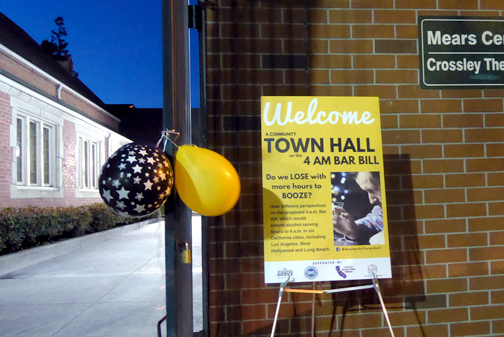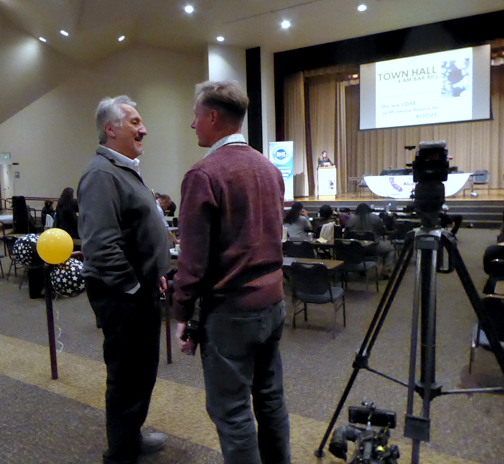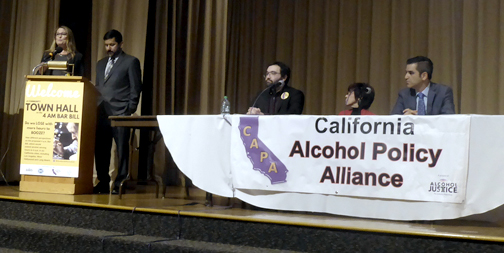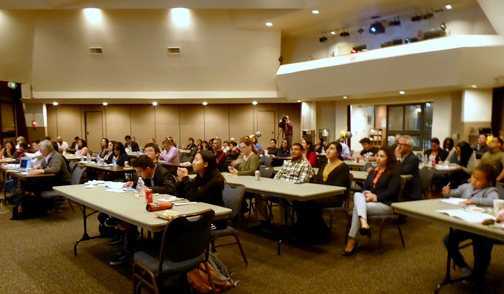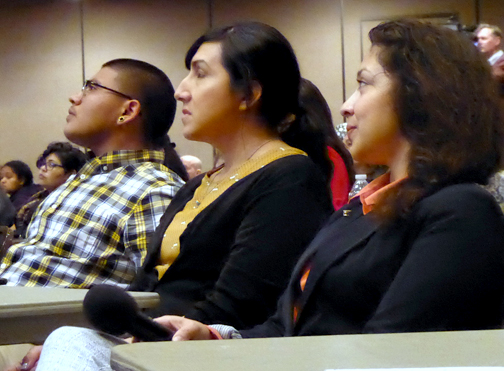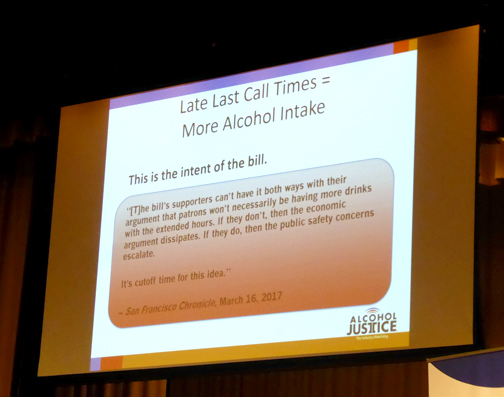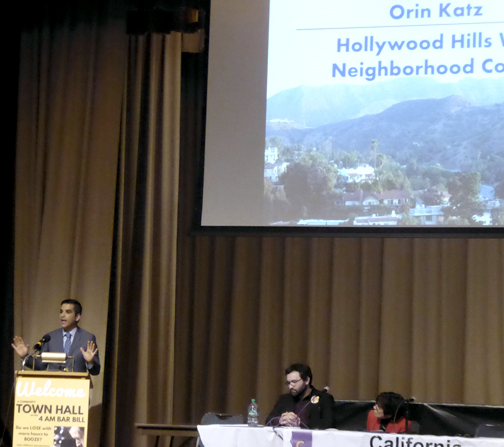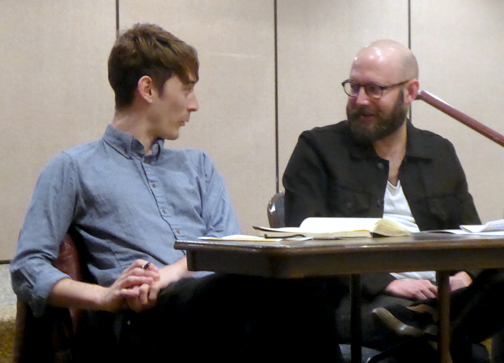
Carson Benowitz-Fredericks, Dr. Deborah Allen and Oren Katz of the California Alcohol Policy Alliance coordinated the meeting regarding the pilot program.
By Julie BUTCHER
On March 8, opponents of the legislation known by many as the “4 a.m. bar bill,” which would begin a five-year pilot allowing six California cities to extend bar hours past 2 a.m., held a town hall panel discussion in Hollywood Presbyterian Church’s Mears Center Auditorium.
The event was coordinated by the California Alcohol Policy Alliance, a statewide advocacy group that states it is organized to “unite diverse organizations and communities in California to protect health and safety, and prevent alcohol-related harm through statewide action.” The panelists were Carson Benowitz-Fredericks, regional manager for the group Alcohol Justice, who offered detailed analysis and statistics on alcohol use and abuse in California; Dr. Deborah Allen, deputy director of the Health Promotion Bureau of LA County’s Dept. of Public Health, who also scrolled through a detailed PowerPoint presentation documenting the increase of alcohol-related public health issues; and Oren Katz, from the City of Los Angeles’ Hollywood Hills West Neighborhood Council, who proffered an emotional argument against the proposed measure and told the crowd that “local control is a lie.”
The current legislation, SB 905, was introduced by San Francisco State Senator Scott Weiner in January 2018 after a previous iteration of the bill, SB 384, failed at the end of the 2017 legislative session. According to the senator, the previous bill would “have allowed every city in California the choice to extend alcohol sales as late as 4 a.m. for restaurants, bars, and nightclubs (but not liquor stores).” The new bill “contains the exact same provisions as the previous bill, but instead of allowing every city in the state to extend hours … the new bill is a five-year pilot program limited to the six cities whose mayors have expressed interest in having the local option to extend hours: San Francisco, Los Angeles, Oakland, Sacramento, Long Beach and West Hollywood. These cities will have the opportunity to engage in a local process and determine for themselves whether to extend hours past 2 a.m.”
Los Angeles City Councilman Paul Koretz, who was invited but did not attend the community meeting, issued a strong statement opposing the legislation, noting that “impacts of a 4 a.m. last call will not stay local. The harms and costs will spread across all of our roadways and communities, forcing all municipalities to pay the price for additional law enforcement, EMT and other costs.”
Sara Cooley, advocacy manager for the San Fernando-based Alcohol Policy Alliance, explained why she believes the bill would be bad for the Crescenta Valley.
“Though this bill would push alcohol service hours to 4 a.m. in just six cities (three in LA County – Los Angeles, West Hollywood and Long Beach), La Crescenta is just 15 miles from DTLA and well within driving range of all three of those cities. Drunk and drowsy late-night revelers will be coming home to La Crescenta or passing through the 210 [freeway] on their way back to homes beyond it.”
Cooley went on to explain that DUIs do not occur at the place where the driver got drunk, but studies have found that drivers had traveled an average of seven miles before getting arrested, with a maximum of 150 miles.
“La Crescenta is well within that range – so we can expect added fatalities and law enforcement/emergency response costs if this passes,” said Cooley. “Our state senator, Anthony Portantino, is on the Senate Governmental Organization Committee, which will be making a decision on this bill on March 13.”
Before the panel discussion, Alcohol Justice’s public affairs director Michael Scippa explained that this is the author’s “fourth attempt, I think.”
“Is there really a crying need to extend bar hours?” he asked. “They say they want LA to be a ‘world-class city.’ Well, I think it’s already a world-class city without drinking into the early hours. We’re not saying places can’t stay open. They could serve non-alcoholic beverages and nutritious snacks as late as they want.”
Scippa explained that, in his opinion, the alcohol industry is behind the bill.
“It’s all about money. Every place sells alcohol. First it’s a pilot, then all the cities are selling liquor all night, then the 7-Elevens, the liquor stores,” he said. “The industry wants alcohol sold 24 hours a day with no restrictions. That’s what this is really about.”
Carson Benowitz-Fredericks began the panel presentation with stark data about “California’s DUI epidemic.”
“We’re seeing year-over-year epidemic numbers of DUIs, a massive increase in fatal accidents, an annual increase of 20% in DUIs. There is nothing that explains this. Uber was supposed to save us, but Uber is clearly not cutting down on DUI accidents and deaths,” Benowitz-Fredericks said. “People drive to bars.”
Oren Katz spoke as the business chair of his neighborhood council.
“More people are hanging out on the street. Marijuana is legal. I’m not against alcohol but I’m seeing more recreational drugs and more homelessness. I’m against over-consumption,” he said. “Imagine that 2 a.m. drunk at 4 a.m., two hours drunker, two hours more tired. There’s a gas station at Fairfax and Sunset that the Planning and Land Use Commission is considering allowing to sell alcohol. Everyone sells alcohol – the RiteAid, the supermarket. As a community, we need to increase time for positive activities.”
But no all present were against the bill. Speaking during the question-and-answer section of the town hall, Adam Englander, executive director of Greater Los Angeles Hospitality Association, argued in favor of the bill.
“By your data, the real problem is off-premise drinking,” Englander suggested. “And by your arguments, why not close at 8 p.m.? Or why not get rid of alcohol entirely and go back to Prohibition?” he asked. “Instead of people coming out all at once, like they do now at 2 a.m., folks would stagger out. It would cut down on illegal house parties and underground after-hours.”
He added that the bill was not mandatory; it allows communities to determine when and where they want what hours.
In proposing the bill, its proponent Scott Weiner noted that, “[B]y taking this nuanced approach to empower – but not require – local communities to extend alcohol sales hours, we can support nightlife in California while also recognizing that there is not a one-size-fits-all solution for each and every city in our great state.”
Ross Gardiner of LA-based Black Circle Media attended the meeting.
“You can’t stamp out these late-night subcultures, like electronic music, DIY punk scenes,” Gardiner said. “If you’re hostile towards them, they’ll go deeper underground and into increasingly sketchy locations. Surely people would prefer that their kids were in a bar or club that’s up to code, rather than in some warehouse like the Ghost Ship in Oakland.”
Gardiner also offered his thoughts on how the bill can have a positive societal effect.
“I come from the cultural side of things, and I can’t see any arguments against it. When we welcome the world to the city in 2028, I don’t want to tell people that the only way to hear music after 2 a.m. is to go wandering around Skid Row looking for a sketchy warehouse,” he said. “That has to change and we have to start being proud of our status as a nightlife capital and make sure that we don’t stunt the growth of this sector by being staunchly combative without looking for amicable solutions.”
Gardiner is also the communications director for a Berlin-based nonprofit called the Creative Footprint that gathers data about live music venues and uses it to support these scenes at the grassroots level. It was founded by Berlin’s club commissioner Lutz Leichsenring and Amsterdam’s night mayor Mirik Milan.
According to Gardiner, Milan believes that, “licensing should always fit the needs of the patrons. In Los Angeles, much of the exciting youth culture that is defining the city internationally is taking place in spaces that are ‘illegal’ and unregulated. By extending the licensing hours you would be bringing a lot of these young creative people into safer spaces, allowing some of this important culture to come above ground.”

